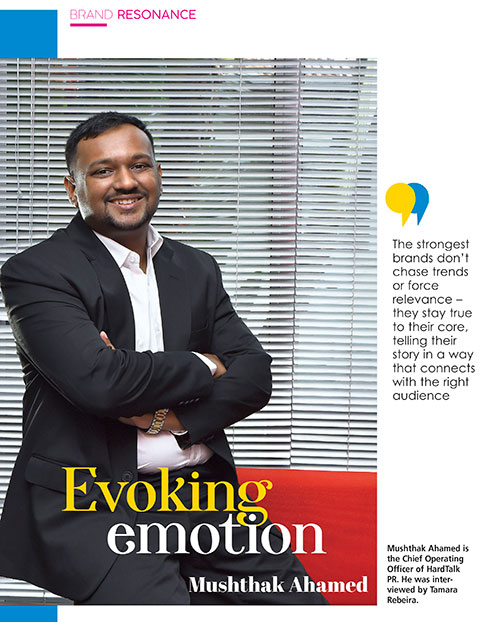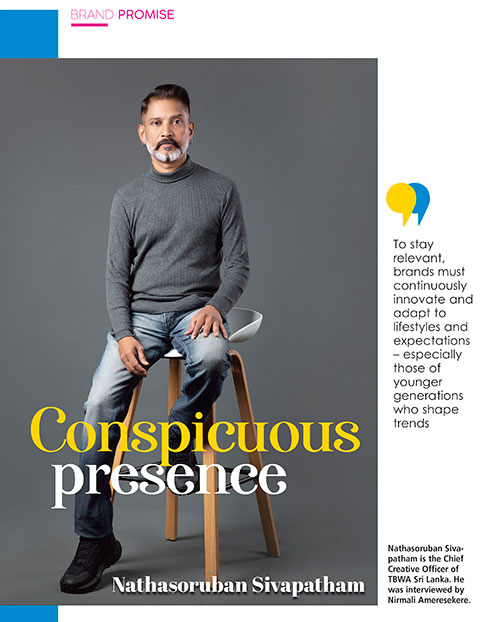BRAND ADVOCACY
Digital humanity
Rajiv Menon
Q: How important is brand purpose in today’s world? And how can businesses ensure authenticity in their branding?
A: Brand purpose is a company’s reason for seeing beyond profits. A meaningful purpose can transform customer engagement, employee pride and overall business resilience.
Millennials and Gen Zs are attracted to brands that stand for something positive – such as sustainability, climate change, progression, social issues and so on. They’re happy to pay more for brands that are making a difference in the world. And the gain is brand loyalty!
Patagonia says that it is in business ‘to save our home planet.’ This environmental stance quadrupled its revenue in the last decade. After the tragic death of George Floyd, Nike posted a video that said: ‘For once, Don’t Do It.’
Consumer trust builds brand love; and for a generation that makes their buying decisions based on trust, it means everything. This approach can even outlive recessions.
A purpose driven company offers employees a sense of pride and satisfaction, and makes them brand advocates. It also helps attract potential employees who are looking for workplaces that match their values.
Businesses should define and stick to their core values, and share their stories genuinely, listen to customers, maintain transparency and consistently live up to their promises.
Q: With the high prevalence of AI and automation, how can brands maintain the human touch while embracing digital advancements?
A: The future of the customer experience isn’t about artificial intelligence versus humans; it’s about AI with humans. The combination of AI’s analytical power and the human emotional quotient (EQ) is very potent.
While artificial intelligence can process data and identify patterns, humans provide context, nuance and emotional understanding. AI handles routine queries in seconds – we can provide personalised responses that help build genuine connections.
Since AI is great at handling time-consuming and repetitive tasks, we have more time to focus on critical thinking, creativity and finding innovative solutions – aspects that are currently beyond the capabilities of automated systems.
It’s about striking the right balance between automation and the human touch. Going forward, brands that master this synergy will derive better results with deeper customer insights, faster response times and more meaningful interactions.
Q: How important is influencer marketing in today’s branding strategies – and how can businesses ensure effective partnerships?
A: Today, consumers seek genuine experiences and recommendations; and they largely do so online. Therefore, the persuasive power of influencers who have a strong online presence can be a powerful asset.
They can engage with their audience in an authentic and targeted manner by creating credible content. This in turn ensures that they build a large and loyal following that trusts them. Influencer marketing has higher engagement rates and costs less than traditional marketing.
Unlike celebrities, influencers are likely to be viewed as friends by their followers. Therefore, identifying the right influencer who shares your brand’s values and whose audience overlaps with your brand is the start to an effective partnership.
When strategically integrated into a campaign, collaborative partnerships with influencers can be very effective. With sponsored posts, an influencer is paid to create content for a brand.
Brand advocacy is where an influencer works as an ambassador over a longer term, creating a narrative that attracts and retains customers. Inviting influencers to become your customers by offering them free products works well too. The resultant content is a sincere, honest review that adds brand credibility.
In affiliate marketing, an influencer offers their audience a discount code on behalf of your brand. And giveaways – whether they’re free items, money or an experience – create excitement, generate a buzz and prompt audience engagement.






